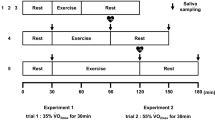Abstract
Relations between feelings and salivary IgA secretion were assessed in co-medical students attending a lecture.
The assessments were performed twice in two different classes held in December, 1999 and October, 2000 in the same manner, then the data of the two trials were combined and analyzed. On the basis of the impression of the lecture, students were divided into two groups: a group who felt interested and another group who felt indifferent or bored. Saliva samples were taken three times, at the beginning of, at the end of, and 15 minutes after the class, then the secretory IgA in saliva was determined by ELISA.
At the end of the class, an increase in salivary IgA secretion was seen in the group who felt interested, while not in the group who felt indifferent or bored. The increasing change in salivary IgA secretion was, however, moderate and transient, namely it increased only by about +30% on average, and returned to the initial level after 15 minutes.
Similar content being viewed by others
References
Childers N, Bruce M, McGhee J. Molecular Mechanisms of Immunoglobulin A Defense. Ann. Rev. Microbiol. 1989; 43: 503–536.
Brandtzaeg P. Salivary Immunoglobulins. In: Tenovuo J, ed.Human saliva. Boca Raton, Florida: CRC Press, Inc.; 1989: 1–54.
Herbert TB, Cohen S. Stress and immunity in humans: a meta-analytic review. Psychosom. Med. 1993; 55: 364–379.
Herbert TB, Cohen S. Depression and immunity: a meta-analytic review. Psychol. Bull. 1993; 113: 472–486.
Hodel L, Grob PJ. [Psyche and immunity. A selected literature study of psychoneuroimmunology in healthy persons]. Schweiz. Med. Wochenschr. 1993; 123: 2323–2341.
Kugler J. [Emotional status and immunoglobulin A in saliva—review of the literature]. Psychother. Psychosom. Med. Psychol. 1991; 41: 232–242.
Tsujita S, Morimoto K. Secretory IgA in saliva can be a useful stress marker. Environmental Health and Preventive Medicine. 1999; 4: 1–8.
Valdimarsdottir HB, Stone AA. Psychosocial factors and secretory immunoglobulin A. Crit. Rev. Oral. Biol. Med. 1997; 8: 461–474.
Jemmott JBd, Borysenko JZ, Borysenko M, et al. Academic stress, power motivation, and decrease in secretion rate of salivary secretory immunoglobulin A. Lancet 1983; 1: 1400–1402.
Jemmott JBd, Magloire K. Academic stress, social support, and secretory immunoglobulin A. J Pers. Soc. Psychol. 1988; 55: 803–810.
Mouton C, Fillion L, Tawadros E, Tessier R. Salivary IgA is a weak stress marker. Behav. Med. 1989; 15: 179–185.
Lowe G, Urquhart J, Greenman J. Academic stress and secretory immunoglobulin a. Psychol. Rep. 2000; 87: 721–722.
Deinzer R, Kleineidam C, Stiller-Winkler R, Idel H, Bachg D. Prolonged reduction of salivary immunoglobulin A (sIgA) after a major academic exam. Int. J. Psychophysiol. 2000; 37: 219–232.
Kiecolt-Glaser JK, Garner W, Speicher C, Penn GM, Holliday J, Glaser R. Psychosocial modifiers of immunocompetence in medical students. Psychosom. Med. 1984; 46: 7–14.
Zeier H, Brauchli P, Joller-Jemelka HI. Effects of work demands on immunoglobulin A and cortisol in air traffic controllers. Biol. Psychol. 1996; 42: 413–423.
Farne M, Boni P, Gnugnoli D, Corallo A. The effect of daily hassles on salivary IgA: experimental evidence. Boll. Soc. Ital. Biol. Sper. 1992; 68: 409–412.
Hucklebridge F, Lambert S, Clow A, Warburton DM, Evans PD, Sherwood N. Modulation of secretory immunoglobulin A in saliva: response to manipulation of mood. Biol. Psychol. 2000; 53: 25–35.
Dillon K, Menchoff B. Positive emotional states and enhancement of the immune system. Int. J. Psychiatry Med. 1985-1986; 15: 13–18.
Harrison LK, Carroll D, Burns VE, et al. Cardiovascular and secretory immunoglobulin A reactions to humorous, exciting, and didactic film presentations. Biol. Psychol. 2000; 52: 113–126.
Jasnoski ML, Kugler J. Relaxation, imagery, and neuroimmuno-modulation. Ann. N. Y. Acad. Sci. 1987; 496: 722–730.
Green ML, Green RG, Santoro W. Daily relaxation modifies serum and salivary immunoglobulins and psychophysiologic symptom severity. Biofeedback Self Regul. 1988; 13: 187–199.
Rood YR, Bogaards M, Goulmy E, Houwelingen HC. The effects of stress and relaxation on the in vitro immune response in man: a meta-analytic study. J. Behav. Med. 1993; 16: 163–181.
Sherman JJ, Carlson CR, McCubbin JA, Wilson JF. Effects of stretch-based progressive relaxation training on the secretion of salivary immunoglobulin A in orofacial pain patients. J. Orofac. Pain. 1997; 11: 115–124.
O'Connor ME, Schmidt W, Carroll-Pankhurst C, Olness KN. Relaxation training and breast milk secretory IgA [see comments]. Arch. Pediatr. Adolesc. Med. 1998; 152: 1065–1070.
Friedman E. Relaxation training and levels of secretory IgA in breast milk [letter; comment]. Arch. Pediatr. Adolesc. Med. 1999; 153: 654–655.
Brennan FX, Charnetski CJ. Stress and immune system function in a newspaper's newsroom. Psychol. Rep. 2000; 87: 218–222.
Wardell DW, Engebretson J. Biological correlates of Reiki Touch(sm) healing. J. Adv. Nurs. 2001; 33: 439–445.
Green R, Green M. Relaxation increases salivary immunoglobulin A. Psychol. Rep. 1987; 61: 623–629.
Olness KC, T, Uden D. Self-regulation of salivary immunoglobulin A by children. Pediatrics 1989; 83: 66–71.
Groer MW, Humenick S, Hill PD. Characterizations and psychoneuroimmunologic implications of secretory immunoglobulin A and cortisol in preterm and term breast milk. J. Perinat. Neonatal. Nurs. 1994; 7: 42–51.
Miletic ID, Schiffman SS, Miletic VD, Sattely-Miller EA. Salivary IgA secretion rate in young and elderly persons. Physiol. Behav. 1996; 60: 243–248.
Pthak S. Quantification of immunoglobulin concentration by ELISA.Immunology Methods Mannual. London: Academic Press LTD; 1997: 1055–1075.
Hucklebridge F, Clow A, Evans P. The relationship between salivary secretory immunoglobulin A and cortisol: neuroendocrine response to awakening and the diurnal cycle. Int. J. Psychophysiol. 1998; 31: 69–76.
Rantonen PJ, Meurman JH. Correlations between total protein, lysozyme, immunoglobulins, amylase, and albumin in stimulated whole saliva during daytime. Acta Odentol. Scand. 2000; 58: 160–165.
Author information
Authors and Affiliations
Corresponding author
Rights and permissions
About this article
Cite this article
Tsujita, S., Morimoto, K. A feeling of interest was associated with a transient increase in salivary immunoglobulin a secretion in students attending a lecture. Environ Health Prev Med 7, 22–26 (2002). https://doi.org/10.1007/BF02898063
Received:
Accepted:
Issue Date:
DOI: https://doi.org/10.1007/BF02898063




